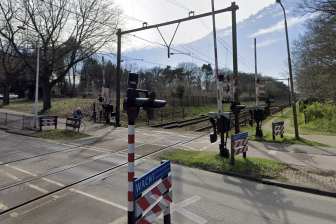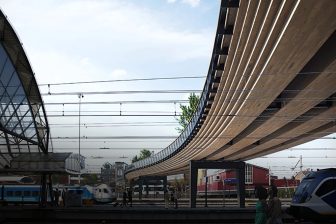High Speed Internet Access on a High-Speed Train
Noordwijk – 21Net Ltd successfully tested satellite and “Wi-Fi” broadband Internet access on board a 300km/hour train on two occasions over a period of four working days.
This demonstration of Ku-band satellite communications to and from a train delivered broadband Internet access at bitrates in excess of 2MBit/s to the onboard system. The project, called “Broadband to Trains” is partly funded by the European Space Agency as part of the ARTES Telecommunications Programme.
The technical trial of bi-directional satellite and “Wi-Fi” broadband Internet access onboard a high speed train was successfully carried out by new operator 21Net on the 22nd and 23rd of June 2004 and on the 27th and 28th of July. The trials were held in the presence of representatives of two train operators and of the European Space Agency.
21Net, a UK-based operator, working in conjunction with a local partner, ran this trial in cooperation with a major european train operator, and satellite operator. “Ten laptops were connected simultaneously and were able to send and receive emails of 5 Megabyte and more, at the same time a receiving real time steamed video from the Web at 300 km/h, for 5 hours per day (the full train journey time), without any interruption of service”, explained Henry Hyde-Thomson, Chairman of 21Net.
The 21Net architecture can provide a nearly symmetric data flow, with a high data rate information flow of more than 2Mbit/s. 21Net believes this is very important in order to provide business class internet services and to support broadband options for the train operator and its customers. A custom-built bi-directional satellite antenna mounted on the roof of the train provides the high data rate broadband connectivity. Onboard the high-speed trains, the equipment allows Wireless LAN access for the passengers.
“This trial was critical to demonstrate the technical feasibility of the broadband offering, also in order to assess the potential commercial implications in terms of services that can be offered”, said Fermin Alvarez Lopez, the European Space Agency representative. “All train operators are looking for Internet access and service solutions for millions of European passengers, without having to manage the service themselves, or to modify their trains. This test shows this is possible”. 21Net will begin pre-operational pilot service trials in October, focusing on bringing a complete set of services to passengers, including broadband Internet access, on-board entertainment and location-aware information.
U las zojuist één van de gratis premium artikelen
Onbeperkt lezen? Profiteer nu van de introductieaanbieding voor € 10,- per maand.
Bent u al abonnee?



